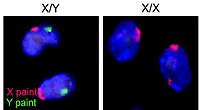
Photo from wikipedia
Evaluating the effects of temperature variations on animals plays an important role in understanding the threat of climate warming. The effects of developmental temperature on offspring performance are critical in… Click to show full abstract
Evaluating the effects of temperature variations on animals plays an important role in understanding the threat of climate warming. The effects of developmental temperature on offspring performance are critical in evaluating the effects of warming temperatures on the fitness of oviparous species, but the physiological and biochemical basis of this developmental plasticity is largely unknown. In this study, we incubated eggs of the turtle (Pelodiscus sinensis) at low (24°C), medium (28°C), and high (32°C) temperatures, and evaluated the effects of developmental temperature on offspring fitness, and metabolic enzymes in the neck and limb muscles of hatchlings. The hatchlings form eggs incubated at the medium temperature showed better fitness-related performance (righting response and swimming capacity) and higher activities of metabolic enzymes (hexokinase, HK; lactate dehydrogenase, LDH) than hatchlings from the eggs incubated at high or low temperatures. In addition, the swimming speed and righting response were significantly correlated with the HK activities in limb (swimming speed) and neck (righting response) muscles, suggesting that the developmental plasticity of energy metabolic pathway might play a role in determining the way incubation temperature affects offspring phenotypes. Integrating the fitness-related performance and the activities of metabolic enzymes, we predict that the P. sinensis from high latitude would not face the detrimental effects of climate warming until the average nest temperatures reach 32 ℃.
Journal Title: Current Zoology
Year Published: 2023
Link to full text (if available)
Share on Social Media: Sign Up to like & get
recommendations!